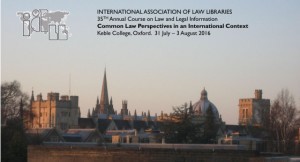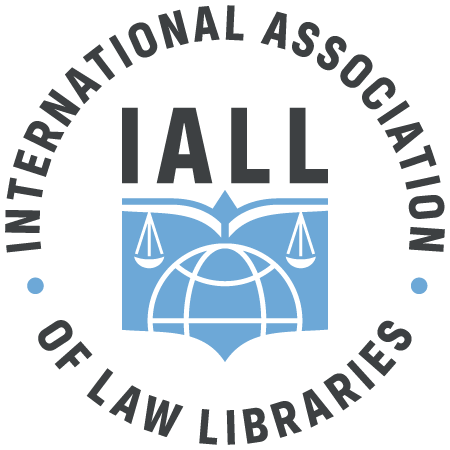
The purpose of this blog is threefold. First and foremost, it is meant to thank the local organizing committee of the Bodleian Law Library, headed by Ruth Bird, for the splendid 35th Annual Course, “Common Law Perspectives in an International Context”, that took place from the 31st July until the 3rd August 2016 in Keble College. There were around 150 delegates and 25 book vendors who took part in the 35th IALL Annual Course.
Secondly, I will hereunder briefly report on this year’s Annual Course, shedding light on the various highly interesting lectures, delivered by excellent professors, and by doing so inform the members of the International Association of Law Libraries and people in the legal information branch who were not able to come to Oxford.
Thirdly, the Board of the International Association of Law Libraries has met twice, prior to the Annual Course and on the Friday thereafter. Partially because of the new composition of the Board but equally because of the normal flow of affairs, the Board is currently seeking Committee Members amongst the Membership of IALL. Please, express your interest and send an email to David.Gee@sas.ac.uk or me (j.vervliet@ppl.nl). In particular, it is about IALL Members who volunteer to sit on the Communication Committee and on the Education Committee. The first deals with the website, the blogs, the newsletter, social media, the listserv, the International Journal of Legal Information; the second is working on guidelines for the profession, information literacy, or possibly on a lecture series paragraph about technicalities of law librarianship, e.g. Open Access.
Common Law System
Emeritus Professor Francis Reynolds started the 2016 IALL Annual Course and lectured on “Diversities Among Common Law Nations”, presenting general observations of differences between Common Law countries. Of course giving a definition – the Common Law being typically English – and contrasting the Common Law system with Civil Law. The United States of America has a Common Law of its own. Touching upon Australia, moving up to Hong Kong, upholding the Common Law values but increasingly using the Chinese language (sic!) in the lower courts, informing about legal developments in Singapore, Canada and India.
Legal History
Two lectures on Legal History followed. First, Emeritus Professor Sir John Baker discussed the legal historical aspects of law reporting in England from 1550-1650. And Professor David Ibbetson lectured about precedent and authority from a continental perspective. He compared the English, common law system, to the European, continental way of law reporting in the seventeenth century.
Brexit
The last lectures of that day were given by Emeritus Professor Mark Freedland, an Emeritus research fellow of St Johns College and Menelaos Markakis, a DPhil Candidate. They discussed legal issues arising from the UK vote to leave the European Union (Brexit). The current time (after the referendum and before the triggering of Brexit and after the referendum) was described by the lecturer as a ‘pause on the road to dystopia’. Several legal issues arise from the Brexit referendum: difficulties relate to compliance with EU law; difficulties to comply with the formal mechanism for leaving the EU (in accordance with Article 50 of the Lisbon Treaty) because Britain does not have a Constitution; the Referendum Act did not clarify the legal routes for the various outcomes etc.
Divorce and Maintenance in Britain
Baroness Ruth Deech, Crossbench peer in the House of Lords, gave a lecture about common law and statutes in family law. She discussed the problems of current British divorce law and maintenance law. A problem of the current system is the use of outdated stereotypes about relationships between men and women. She has drafted a bill, based on a partnership model, on the binding character of prenuptial (and postnuptial) agreements, and on a maximum of 5-year maintenance period instead of the indefinite maintenance costs.
On-demand Economy – Humans as a Service
Associate Professor Jeremias Prassl lectured on “Humans as a Service?: Regulating Work in the Sharing Economy” and spoke about some trends in labor law and the current economy. In the 21st century new ways of working have emerged, like Uber, but there are many negative aspects related to the on-demand economy, such as low and insecure or even no guarantee of ongoing work, no notification of dismissal, a lack of social rights and a lack of employer accountability, no liability insurance.
Big Data
Professor Karen Yeung spoke about the legal implications of algorithmic regulations and big data and how they affect us and how we could benefit from them in daily life, now and in the near future. Most legal debates have been focused on contemporary data protection laws and the right to informational privacy, given that many algorithmic systems rely on the continuous monitoring of individuals and the collection and algorithmic processing of digital data pertaining to individuals. But constitutional values and principles are at risk in this ‘algocracy’, e.g. equality of treatment, because data mining technologies are ‘discriminatory by design’, and hence risks of undermining key aspects of democracy, equality, fairness and distributive justice.
Globalization
Emeritus Professor William Twining gave the last lecture of Tuesday, August 2. During his lecture, he discussed what globalization means to him. In his opinion globalization is a highly complex phenomenon, no lawyer can deal with only one jurisdiction nowadays, however, one must avoid reductionism when discussing globalization. There is nothing like Global Law. According to Twining a global perspective can help us to recognize both diversity and the complexities of our relations with others. Practitioners should study comparative law.
International Refugee Law
Professor Guy Goodwin-Gill gave a lecture about the refugee law, its history and its current state. International refugee law finds its roots in the 1921 European unrest in the aftermath of the Russian Revolution and First World War, as a displacement of large numbers of people (e.g. 800,000 Russians) was asking for a resolution. For settling this the Council of the League of Nations appointed Fridtjof Nansen as the first High Commissioner in August 1921 issuing identity papers, focusing also on unaccompanied children, disabled refugees. In 1933 the League of Nations opened an office, for refugees (Jewish and other) coming from Germany. The High Commissioner James Grover MacDonald resigned in 1935 as the League was unwilling to deal with the root cause of the German refugee situation. In 1946, the 1st session of the UN General Assembly met, in the Central Hall in Westminster; refugees and migration were the most important issues It recognized certain basic refugee principles. 1948 saw the Universal Declaration of Human Rights being issued, the start of modern refugee law. In 1951 the UN High Commission for Refugees was created. Currently, the European states have not worked well together to deal with refugees in the recent humanitarian crisis (also in light of what was achieved in the past; in the 1930s 500,000 Italians crossed into France in just 2 weeks). Today, every state considers another states as being responsible for refugees, a policy that will lead to disasters. Working together, standardizing the asylum procedures, a collaborative response is needed. Economic refugees are equally entitled to be treated as refugees.
Comparing UK and International Data Protection Law
Lawyers in media organizations seem mainly to be concerned with defamation and breach of privacy, not data protection issues. Data protection soon after this became a more pressing issue for journalists. Now, there is generally a growing awareness about data protection. UK and EU Acts relate to data protection in the UK, and a single pan-European law (the “General Data Protection Regulation”) was adopted in April 2016. Although the “Right to be forgotten” is a misleading term and a difficult new area of law.
Human Rights in Reshaping Investor-state Arbitration
Professor Susan Karamanian gave lecture about the role of human rights in reshaping investor-state arbitration, i.e. a system under international law that provides an investor an avenue to adjudicate disputes through international arbitration against a foreign government. Recent decisions of investor-state arbitral tribunals have recognized a state’s legitimate right to protect the health and welfare of its citizens without liability to a foreign investor. Still, much work needs to be done on integrating human rights (jus cogens) norms into investor-state arbitration.
Oxford Excellent
The Annual Course with a session on Open Access. On Friday August 5, a small delegation visited the Library of the Supreme Court in London. Papers from the IALL Annual Course will be published in a forthcoming edition of The International Journal of Legal Information. At blog-sites, such as DipLawMatic (Herb Somers and Julienne Grant) and at the Peace Palace Library (Eveline van Trigt, but I am also indebted to Jennifer Findlay for her notes), you can found reports as drafted by colleague-attenders of Oxford’s excellent IALL course.
Jeroen Vervliet
IALL President
